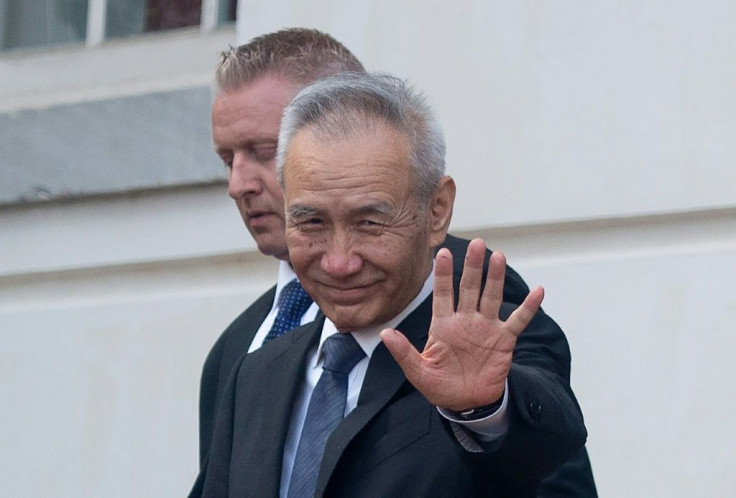Monday's Stock Market Open: US Equities Rise Ahead Of Signing Of China Trade Deal

KEY POINTS
- The U.K. economy unexpectedly shrank in November.
- A member of the Bank of Englang suggested rates might be cut if the economy continues to slow.
- Trump expressed his support for Iranian protesters
U.S. stocks traded higher on Monday as investors look forward to Chinese and U.S. officials signing phase one of a trade deal this week, while keeping a wary eye on developments in Iran.
The Dow Jones Industrial Average gained 74.65 points to 28,898.42 while the S&P 500 rose 16.27 points to 3,281.62 and the Nasdaq Composite Index advanced 64.06 points to 9,242.92.
China’s top trade official Liu He and his team are expected to sign a phase one trade deal with the U.S. on a visit to Washington this week.
“Even getting to this phase one agreement, when we weren’t sure we would get here, really shows that there’s political will to de-escalate trade tensions between China and the U.S.,” said Lucy Meagher, investment adviser at Evan’s and Partners. “We expect that to be a positive.”
The assassination of Qassem Soleimani, a powerful Iranian general by U.S. drone strike, “was front and center of literally every major newspaper, website and broadcast last week, and the investment community was braced for more fallout in financial markets,” said Chen Zhao, chief global strategist at Alpine Macro. “However, the crisis has disappeared as quickly and unexpectedly as it came, and the melt-up in stocks has resumed.”
Over the weekend, President Donald Trump tweeted his support for Iranians who were protesting their country’s allegedly accidental shooting down of a Ukrainian commercial aircraft last week. Trump also tweeted on Sunday that he “couldn’t care less” if Iran negotiated with the U.S. or not, but warned Teheran not to kill protesters.
Iran remained a big question mark for some analysts, however.
“I actually think this [Iran] is going to be a more important issue for investors this year than China-U.S.,” said Alastair Newton, director of Alavan Business Advisory and a former British diplomat.
Newton predicted Iran there will make more retaliatory strikes against U.S. targets this year.
On Sunday the al-Balad airbase in Iraq was hit by eight Katyusha rockets. There were no casualties.
Boston Federal Reserve Bank President Eric Rosengren said on Monday that the central bank officials are forecasting an “almost ideal” outcome in 2020 in which the labor market will remain strong and inflation will approach the central bank’s 2% target.
But Rosengren cautioned about potential risks to that scenario. “Central bankers do not have much historical experience with extended periods where interest rates are running below the estimated equilibrium level while unemployment rates are, simultaneously, historically low,” Rosengren said. “So we want to be alert to any potential risks emerging.”
Rosengren voted against the three rate cuts approved by the Fed last year. He now said he thinks the Fed should be concerned about the risk of prices growing faster than expected and the labor market tightening.
The U.K. economy unexpectedly contracted ahead of the December general election. Gross domestic product edged down by 0.3% in November, missing projections for unchanged output. This means that December will have to deliver growth of 0.1% to 0.2% in order to prevent the economy from shrinking in the fourth quarter.
Gertjan Vlieghe, a member of the Monetary Policy Committee of the Bank of England, suggested the central bank may cut interest rates depending on how the U.K. economy performs since the election. The committee next meets at the end of this month. The bank has not cut rates since 2016.
“Our central forecast is for uncertainty to ease, prompting a turnaround in the outlook for the [British] economy that prevents the [committee] from cutting in the near term,” said Bloomberg economist Dan Hanson. “But we recognize this call hangs in the balance. Any downside surprises relative to our expectations would lead us to reconsider it.”
Overnight in Asia, markets closed higher. China’s Shanghai Composite climbed 0.75%, while Hong Kong’s Hang Seng gained 1.11%, and Japan’s Nikkei-225 rose 0.47%.
In Europe markets closed mixed, as Britain’s FTSE-100 gained 0.39%, France’s CAC-40 slipped 0.02% and Germany’s DAX fell 0.24%.
Crude oil futures dropped 1.19% at $58.34 per barrel and Brent crude fell 1.09% at $64.27. Gold futures dropped 0.49%.
The euro rose 0.15% at $1.1139 while the pound sterling fell 0.64% at $1.298.
© Copyright IBTimes 2025. All rights reserved.




















